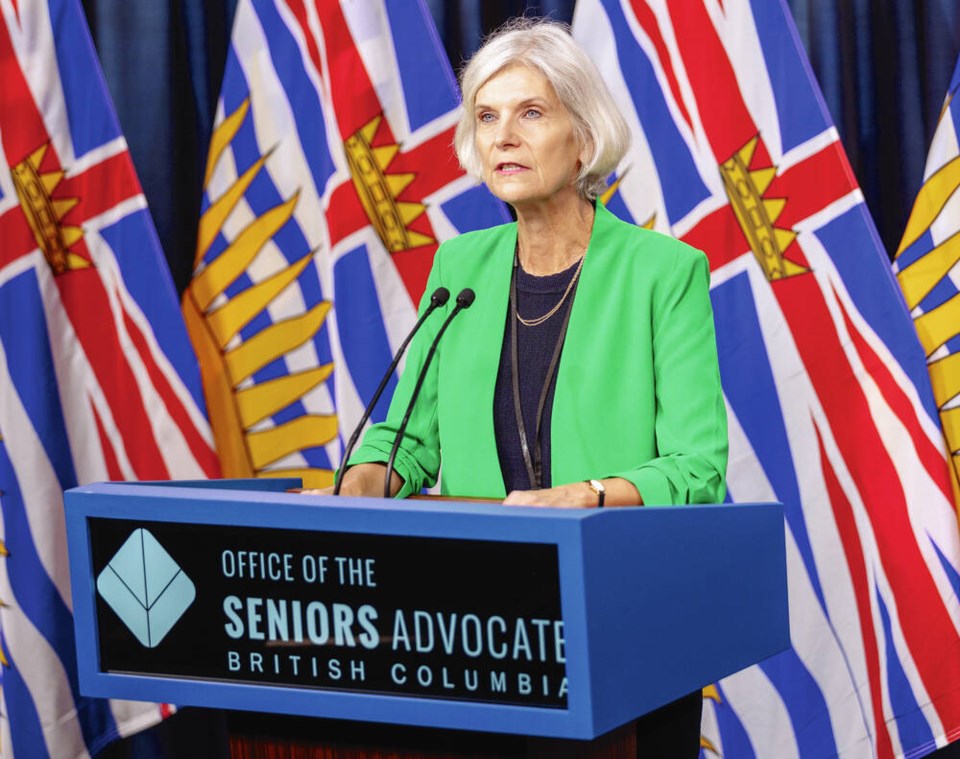British Columbia seniors who face eviction from long-term, affordable rental housing face "catastrophic" consequences and a growing number of older residents are at risk of becoming homeless, says the province's seniors advocate.
Everyone deserves to be adequately housed, Isobel Mackenzie said in an interview with The Canadian Press, but she noted the growing need for homes earmarked for seniors has become particularly dire for those with low, fixed incomes during what should be their golden years.
Data compiled and released by Metro Vancouver this month show the BC Housing wait-list for social housing has 18,865 households on it, with seniors and families in most need.
That's a 27 per cent jump from 2022, and although the BC Housing wait-list doesn't provide the full picture across the province for social housing needs, the increase doesn't surprise Mackenzie.
She said as more people retire and start collecting old age security, Canada Pension Plan payments and other benefits, many seniors see their incomes drop dramatically from their working years to the point where they can no longer afford to pay rent.
Seniors who rent, she said, typically make up to 50 per cent less than other renters and shelter rate subsidies have not kept up with rising rental costs in B.C.
"Renters in the private market are retiring," she said. "They can no longer afford their rents even with the rent supplement, and they need to move to rent-geared-to-income senior subsidized housing. That's what we're seeing in these wait list increases."
Mackenzie said there's been an "uptick" in the number of people over 60 in homeless shelters, and even single-room occupancy buildings are now financially out of reach for many.
"Most seniors who rent have been renters all of their adult life," she said. "Very few people go from homeowner to renter in retirement."
Another issue, she said, is that the province's scarce subsidized housing options are earmarked for both seniors and people with disabilities, a group that now includes those with mental health and addiction issues.
"In some areas where this is happening it is not working," she said. "My office hears from them, the seniors are complaining. There's disruption."
Access to subsidized housing is based on a triage system, she said, and people who are homeless or at imminent risk of homelessness get priority.
"They deserve housing, but we're not increasing the stock of seniors housing," she said. "What we have been seeing with seniors housing is the proportion of units occupied by seniors has been decreasing."
Seniors or people with physical disabilities may be struggling financially and be in need of subsidized housing, but the number of available units has been shrinking amid growing demand, she said.
"They've been shrinking because we have not been keeping up with population growth in terms of units available," she said. "And we've made those units available to people who aren't seniors but have other reasons why they need the unit."
Mackenzie said seniors who may have been renting the same unit for many years face "catastrophic" consequences if they lose the affordability and security of a rent-controlled apartment in a community where they've made connections and have social supports.
Only about eight per cent of subsidized units turn over each year, she said, and some people who are evicted from long-term tenancies may end up in long-term care prematurely.
In response to the data released by Metro Vancouver, the B.C. Housing Ministry said the provincial government is making "historic levels of investment across the housing spectrum" after decades of "inaction and underinvestment from governments."
“We know we’re in a housing crisis, both in Metro Vancouver but also in communities across the province," Housing Minister Ravi Kahlon said in a written statement to The Canadian Press. "We are taking strong action to meet this moment and doubling down on record housing investments … and actions to tackle these challenges head-on, and deliver more homes for people, faster."
But building enough subsidized housing can't happen overnight, and subsidies available are "woefully inadequate," Mackenzie said.
Increasing available subsidies is something the province could do "very quickly," she said.
"That is what would be transformative and address my most immediate concern, which is the people who are sitting in rental apartments right now who are subject to eviction," Mackenzie said. "Look at the income, 50 per cent of B.C. seniors simply cannot afford market rent, period."
This report by The Canadian Press was first published Dec. 24, 2023.
— By Darryl Greer in Vancouver
The Canadian Press



